Vision and Motivation
“The building has minor damage, there is nothing serious,” Mohamed Rana insisted. “It will stand for 100 years!” [1] The assembled textile workers exchanged anxious glances, but when the factory owner threatened wage sanctions, they filed reluctantly back into Dhaka’s Rana Plaza Complex. Hours before, a gaping crack stretching across five floors had appeared, sending frightened employees running into the streets. [2] Just 45 minutes later, another of Bangladesh’s power blackouts plunged the factory into darkness, and the heavy generators on the roof roared to life. [3] As their vibrations destabilized the flimsy walls, the entire building came crashing down. Over a thousand workers were killed on April 24, 2013, with many more left injured and unable to work again, sparking worldwide outrage and a demand for meaningful change. [4]
Dhaka’s winding streets are dotted with nondescript concrete towers like Rana Plaza, rising from muddy markets and makeshift homes, and built with little concern for building codes or quality of materials. [5][6] Most are textile factories packed with the country’s four million garment industry employees. These workers remain the world’s poorest, performing what Pope Francis has described as “slave labor.” [7] Even the inmates of Bangladesh’s infamous prisons are better nourished. [8]
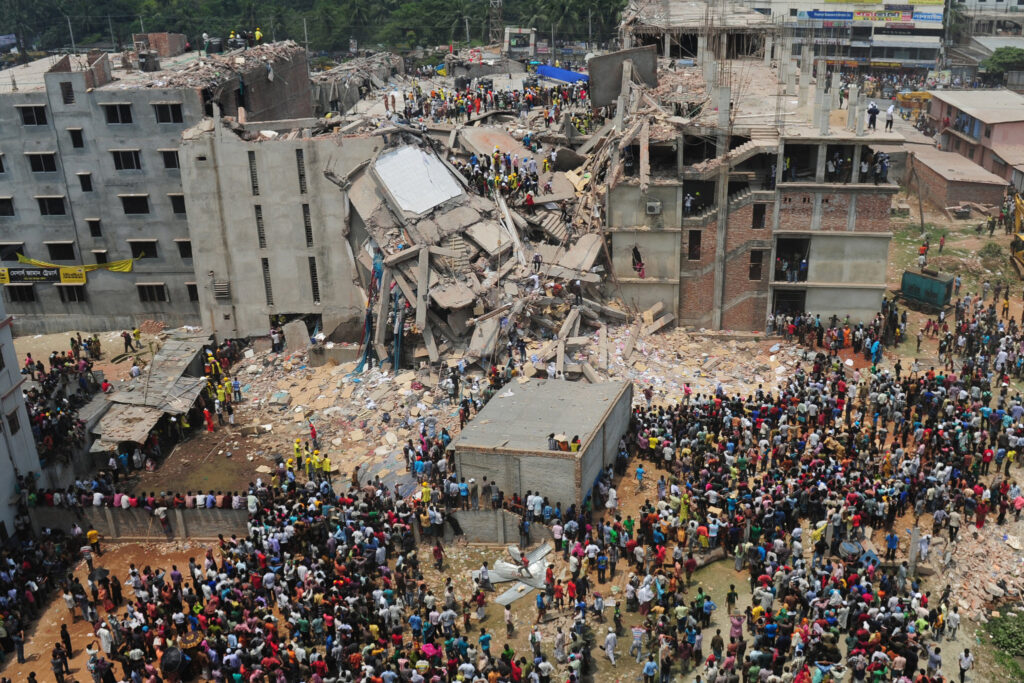
Reformers have criticized poor safety standards, arguing that workers did not simply “die” in the frequent factory fires – they were “killed.” [9] As one worker rights activist puts it, “It really is an extraordinary achievement, in an ironic sense, that the U.S. apparel industry has managed to replicate early 20th century conditions that were so brutal and cruel to workers.” [10] Nonetheless, the government has remained unresponsive. Commenting on the 2013 Rana Plaza collapse, Bangladesh’s finance minister remarked, “…the present difficulties…well, I don’t think it is really serious – it is an accident. And the steps we have taken in order to make sure it doesn’t happen [again] are quite elaborate and will be appreciated by all.” [11] Nonetheless, in the year following the disaster, fires continued to ravage factories at a rate of one to four per month, leaving hundreds of workers injured. [12] As 10% of Bangladeshi parliamentarians are also factory owners [13] , and many other media tycoons, [14] reform is painfully slow as safety agreements are proposed and quickly forgotten. [15][16]
In November 2013, six months after the Rana Plaza collapse, 200,000 strikers arranged blockades, undeterred by rubber bullets and tear gas. [17] Eventually, terrified of damaging an industry which contributes to over 17% of the country’s GDP, [18] the monthly minimum wage was increased by 79%, to $68. [19] However, it was the international response to the Rana Plaza disaster itself, amplified by the tireless efforts of the Bangladesh Center for Worker Solidarity (BCWS), which truly “changed everything.” [20] Under unrelenting pressure and media coverage, over 175 international retailers – including Adidas, Puma, Zara, and Fruit of the Loom – pledged support to improve worker conditions and avert another tragedy.
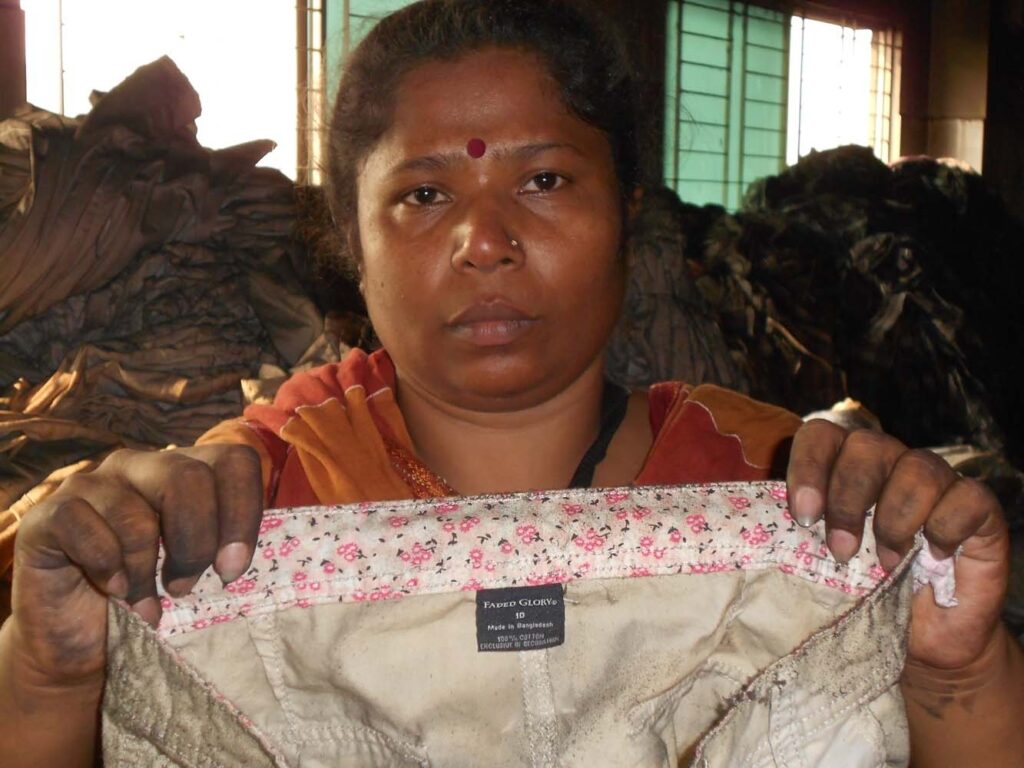
Goals and Objectives
Ultimately BCWS is committed to guaranteeing safe working conditions and fair wages. Akter believes empowering unions is critical. “If you are serious about preventing future deaths,” she argues, “you must involve workers in the monitoring.” [27] The Accord provides unions with a role as counterparties to the signatory brands, in order to ensure its provisions are truly enforced. [28]
Leadership
From the age of 12, Akter herself worked 14-to-15-hour days as a sewing machine assistant to support her sick parents, often snatching a few hours of sleep on the factory floor. For years she genuinely believed the “owners were kind people who gave us jobs,” [29] but after attending a labor law class she was “born a second time.” [30] “Oh my gosh, there is a law – and how they’ve been cheating us!” [31] “I became an organizer,” she recalls, “and never stopped.” [32] At fifteen she became president of the union, but was fired for her advocacy. In 2001 she co-founded BCWS, an organization dedicated to creating a “congenial atmosphere for increasing productivity and contributing to the national economy.” [33] Undeterred by being blacklisted from numerous factories, she delighted in “becoming a problem maker for the whole industry.” [34]
Bangladesh’s national police force, particularly the ominously titled Rapid Action Battalion (RAB), “has a well-deserved reputation for brutality, corruption, and incompetence,” [39] with factory owners routinely bribing them to “force workers protesting late wages to [go back to] work.” [40] Custody deaths have “assumed endemic proportions”; police openly admit to using torture to extract information, and phone taps have become so routine that a government center exists to monitor them. [41] Even the apparently innocuous Bangladesh Garment Manufacturers and Export Association (BGMEA) has been described as a “country within a country,” “capable of applying any kind of power.” [42] Workers attempting to form unions have been beaten, robbed and held at gunpoint. [43]
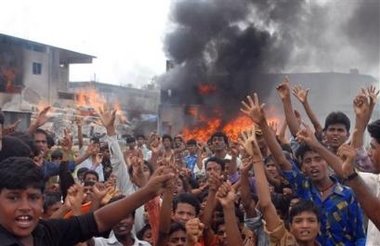
Aminul Islam himself was plagued with nightmares of torture after police detention, and on April 2012, as the authorities struggled to “vanish [the center] forever,” he disappeared. [44] Two days later his body was discovered, hastily buried in a pauper’s grave, bearing marks of torture “definitely [inflicted] by a professional goon squad.” [45]
Determined to continue with her advocacy, Akter mounted an international campaign to reinstate the Centre and demand justice for Islam’s killers. International labor rights groups and Western apparel manufacturer groups wrote to President Hasina requesting an investigation into Islam’s death. [46] Bowing to commercial and political pressure, the government reluctantly formed a high-level committee to attempt to solve the murder. [47]
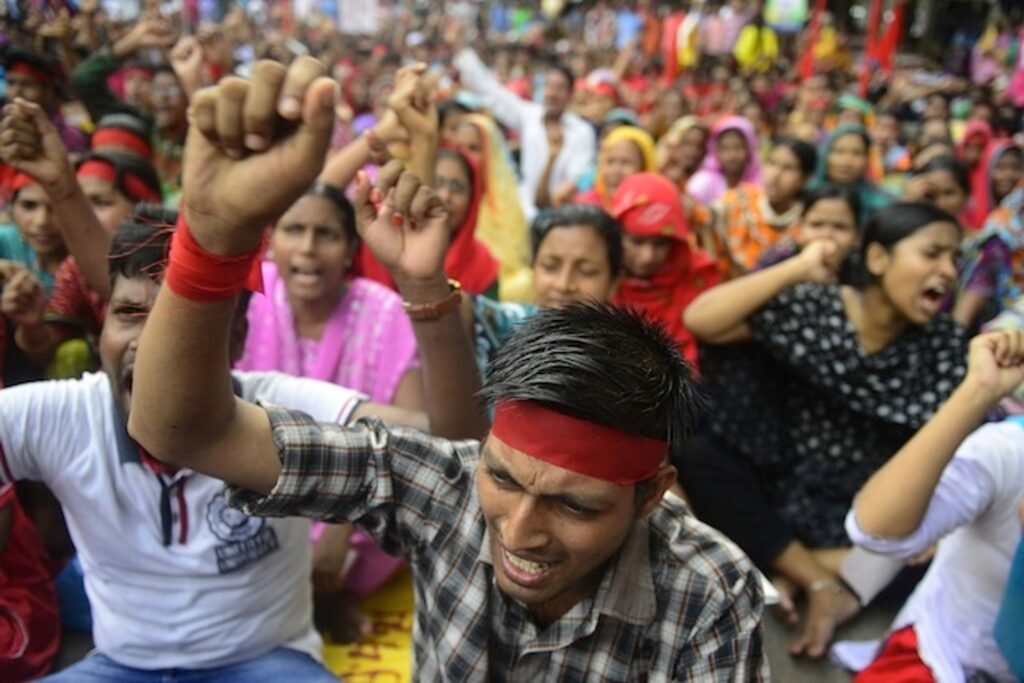
Message and Audience
Reba Sikder broke down in tears as she recalled the Rana Plaza collapse. “It’s true I survived,” she told a packed hall of University of Minnesota students, “but I saw a large number of my coworkers die.” [50] Together with Kalpona Akter, she was invited to address students throughout the US as part of a United Students Against Sweatshops “End Deathtraps” tour to “take direction from grassroots unions to hold brands accountable for labor abuses.” [51]
On the first anniversary of the collapse, students across the US demanded that university-endorsed apparel licensees sign the Accord, [52] organized vigils and rallies, and even occupied one university president’s office to push for severing ties with Jansport. [53] Over 150 campuses are involved in the USAS Campaign with impressive results. 23 universities now insist their brands sign the Accord, and 17 high-profile college logo brands including Adidas and Fruit of the Loom adhere to its requirements. [54] Fashion and ethics-savvy students are enthusiastic about the campaign; as USAS student coordinator Garrett Strain notes, “I don’t think any Minnesota student wants to see a U of M T-shirt pulled from the wreckage at the next factory disaster.” [55]
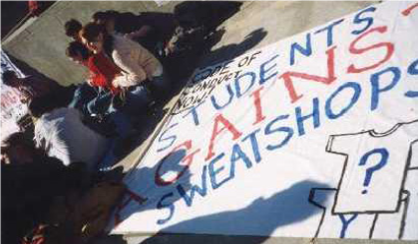
In addition to student advocacy, Akter also lobbies the US government to “put genuine pressure on U.S. corporations and on overseas suppliers in places like Bangladesh in the context of U.S. trade relationships, to compel greater respect for the rights of workers.” [56] In February 2014, she urged the US government to ensure collective bargaining powers, uphold workplace safety, and urge Bangladesh to conform with International Labor Organization standards. [57] In June 2013, the American government suspended Bangladesh’s export privileges to the US after a review uncovered “serious shortcomings” in safety standards. [58] Akter believes that this suspension “sent a clear message to the garment industry that compliance with human rights, labor rights, and workplace safety must be improved.” [59] Bangladesh’s progress was again assessed in July 2014, and although conditions had improved, the American government’s insisted that “there is much more work still be done” before privileges could be reinstated. [60]
Although she regularly addresses international audiences through interviews and magazine articles, as a former worker herself, Akter advocates primarily from the factory floors. Through open stage discussions, International Women’s Day events and training sessions, she tirelessly educates workers and insists that all safety reports are translated into Bengali. [61] Workers, such as Nomita Nath, a union president in Chittagong, are equally passionate about improving conditions: “I am a woman and I want female workers to have rights. The only way to hear a woman’s voice is through the union…that’s my struggle…union and unity.” [62]
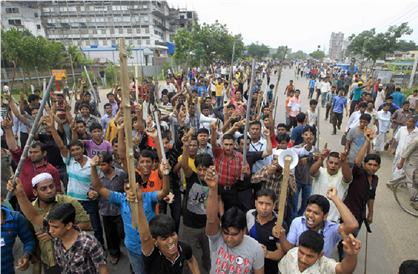
Civic Environment
President Hasina has branded union leaders as “enemies of the nation” who must be dealt with “using an iron hand”, with the help of new “industrial police.” She has warned, “we will not spare anyone who is behind [attempts to organize for a higher minimum wage]. We will find out the provocateurs and try them.” She has also accused the opposition party of “provoking the garment workers to create chaos with an evil design to gain political benefit.” [65]
Although Bangladesh is an electoral democracy, vocal opposition is not tolerated, and corruption is endemic. Political activities, rallies and demonstrations are tightly regulated, and several high-profile opposition leaders have disappeared under suspicious circumstances. [66] Even the country’s High Court expressed concern about the wellbeing of labor leader Montu Ghosh, specifying that the police were prohibited from “torturing or humiliating him.” [67] Unsurprisingly, in this claustrophobic political climate, BCWS was harassed by both the government and the factory owners while international apparel manufacturers remained unconcerned.
The Bangladeshi government claims that the International Labor Organization (ILO) conventions 87 and 98, signed a year after Bangladeshi independence, prohibit dismissing, threatening or injuring trade union members, while a flurry of recent legislation, including the Bangladesh Labor Act (2006), EPZ Workers Association and Industrial Relations Act (2004), were drafted to enhance these protections. [68] Yet agile legal maneuvering ensured that freedom of association and collective bargaining powers remain elusive; in many regions, workers’ associations exist only on paper. [69] In the wake of the Rana Plaza collapse, workers continued to face intimidation; one factory owner was witnessed throwing a union registration application in the dustbin, while another accused a union member of “polluting the factory” and told her “to work in a brothel.” [70] Even the NGO Bureau can be invoked to disrupt civil society and the protections offered by NGOs. In August 2010 alone, over 300 NGOs registrations were cancelled, for alleged “corruption and misuse of foreign funds.” Two months before, the BCWS registration had also been canceled, bank accounts frozen and property seized. [71]
Despite intimidation, BCWS continued to document and publicize cases of union intimidation to demonstrate the inefficacy of existing legal protections. Following international campaigning, the organization’s registration was reinstated in August 2013. Human Rights Watch and Amnesty International wrote letters to President Hasina urging her to cease business with the factories involved in the BCWS detention; 19 members of Congress repeated the same demand, and the ambassador for Bangladesh was contacted. [72][73][74]
Outreach Activities
Together with US senators, thousands of university students and millions of Bangladesh’s poorest workers, Kalpona Akter has helped secure tangible improvements in the nation’s factories; over 1,500 factories have been inspected for unsafe electrical boxes, structural soundness, and sprinkler systems by the Accord’s 110 engineers. [75][76][77] Maternity leave, daycare centers and factory level unions have also been achieved in some factories. [78][79]
In the wake of the media frenzy, over 175 brands worldwide signed the Accord, yet the Arcadia Group, owner of popular British stores Topshop and Miss Selfridge, remained a notable exception. [80] Insisting that Arcadia ensured its factories in Bangladesh were “compliant with our own stringent code of conduct,” billionaire CEO Sir Philip Green initially declined to commit his support. [81] Within weeks, Topshop became a “battering ram,” [82] as critics created a Change.org petition attracting nearly ten thousand signatures, lambasted the store in the media, and even donned black veils for a symbolic funeral outside its flagship store. [83] Finally, in September 2013, Arcadia capitulated and joined as a signatory. While some prominent brands including JanSport remain resistant to the Accord, pressure is mounting as increasing numbers of universities drop contracts with licensees refusing to comply. [84]
In spite of these accomplishments, problems still remain. The Accord’s inspectors have identified issues at “every factory [they]’ve inspected,” noting that there are lockable gates at 90 percent of the factories. [85][86] A 2014 British documentary showed girls as young as thirteen being slapped and kicked in Bangladeshi garment factories. Further footage shows managers in the Vase Apparel Factory coaching employees on answering inspectors’ questions, hastily bringing out safety equipment for the duration of the inspection, and demanding workers attest to their participation in nonexistent training sessions. [87][88]
Learn More Section
Books
[1] Siegle, Lucy, and Jason Burke. We Are What We Wear: Unravelling Fast Fashion and the collapse of Rana Plaza. : The Guardian, 2014. Kindle Edition.
[2] Timmerman, K. (2012). Where am I Wearing: A Global Tour to the Countries, Factories, and People That Make Our Clothes [Kindle Edition].
Video
[1] Fault Lines- Made in Bangladesh. (2013, Al Jazeera English). http://www.youtube.com/watch?v=4dQGl_lswYY
[2] The Shirt on Your Back. (2014, April 16). http://www.theguardian.com/world/ng-interactive/2014/apr/bangladesh-shirt-on-your-back
[3] In-focus Garment Workers of Bangladesh. (2014, January 22). http://www.youtube.com/watch?v=pXBskrO7Kdw
[4] Inside Story- Bangladesh: Sanctions for Safety. (2013, May 3). http://www.youtube.com/watch?v=xXtNR92dwm8
[5] “You can safely invest in Bangladesh” – Interviews with Kalpona Akter. (2010, January 1). http://vimeo.com/12425670
[6] Kalpona Akter & Reba Sikder: Bangladesh Garment Worker Tour. (2014, March 1). http://vimeo.com/89166029
[7] Over 200 Killed in Bangladesh Factory Collapse After Workers Forced to Ignore Building’s Dangers. (2013, April 25). http://www.democracynow.org/2013/4/25/over_200_killed_in_bangladesh_factory
[8] Survivor of Bangladesh’s Tazreen Factory Fire Urges U.S. Retailers to Stop Blocking Worker Safety. (2013, April 25). http://www.democracynow.org/2013/4/25/survivor_of_bangladeshs_tazreen_factory_fir
News and Analysis
[1] “Enemies of the Nation or Human Rights Defenders? Fighting Against Poverty Wages in Bangladesh.” SweatFree Communities, International Labour Rights Forum, http://www.sweatfree.org/docs/enemiesofthenation.pdf.
[2] “Exclusive Interview: Kalpona Akter, Executive Director of Bangladesh Center For Worker Solidarity.” https://www.sourcingjournalonline.com/exclusive-interview-kalpona-akter-executive-director-of-bangladesh-center-for-workers-solidarity/.
[3] “Freedom in the World: Bangladesh.” Freedom House, Jan. 2013, http://freedomhouse.org/report/freedom-world/2013/bangladesh#.U8dpq_mSygV.
[4] Akter, K. (2014, February 11). Prospects for Democratic Reconciliation and Improving Workers’ Rights in Bangladesh. http://www.foreign.senate.gov/imo/media/doc/Akter_Testimony.pdf.
[5] Greenhouse, S., & Harris, E. (2014, April 21). Battling for a Safer Bangladesh. http://www.nytimes.com/2014/04/22/business/international/battling-for-a-safer-bangladesh.html?_r=0.
[6] Newell, S., Ascherman, R., & Strain, G. (2014, June 18). After Rana Plaza: Setting the Record Straight on the Bangladesh safety Accord. http://usas.org/2014/06/18/after-rana-plaza-setting-the-record-straight-on-the-bangladesh-safety-accord/.
[7] A Chronology of the Investigation of the Murder of Labor Activist Aminul Islam. (2012, August 6). http://laborrights.org/publications/chronology-investigation-murder-labor-activist-aminul-islam.
[8] Bangladesh Center for Worker Solidarity Home page: http://www.solidaritycenter.org/content.asp?contentid=1806.
[9] BBC Bangladesh profile. (2014, March 19). http://www.bbc.com/news/world-south-asia-12651483.
References
[1] Siegle, Lucy , and Jason Burke. We Are What we Wear: Unravelling Fast Fashion and the collapse of Rana Plaza. : The Guardian, 2014. Kindle Edition.
[2] “Over 200 Killed in Bangladesh Factory Collapse After Workers Forced to Ignore Building’s Dangers.” . Democracy Now!, 23 Apr. 2013. Web. 17 July 2014, http://www.democracynow.org/2013/4/25/over_200_killed_in_bangladesh_factory.
[3] Ibid.1
[4] “Bangladesh Disaster:”Little Help” For Rana Plaza Victims.” . BBC News, 24 Oct. 2013. Web. 17 July 2014. http://www.bbc.com/news/world-asia-24649848.
[5] Ibid.1
[6] Davnath, Arun. “Bangladesh Raises Minimum Wage for Garment Workers After Unrest.” . Bloomberg News, 15 Nov. 2013. Web.17 July 2014, http://www.bloomberg.com/news/2013-11-13/bangladesh-garment-factories-to-stay-shut-amid-worker-protests.html.
[7] “Bangladesh factory collapse: pope condemns ‘slave labour’ conditions.” . The Guardian, 1 May 2013. Web. 17 July 2014, http://www.theguardian.com/world/2013/may/01/bangladesh-factory-pope-slave-labour.
[8] Hossain, Jakir, Mostafiz Ahmed, and Afroza Akter. “Bangladesh Labour Law: Reform Direction.” BILS Research and Advisory Team, 1 Nov. 2013. Web. 17 July 2014. www.ituc-ap.org/wps/…/report-of-the-baseline-study-on-bangladesh.pdf.
[9] “Enemies of the Nation or Human Rights Defenders? Fighting Against Poverty Wages in Bangladesh.” . SweatFree Communities, International Labour Rights Forum, Nov 2010, http://www.sweatfree.org/docs/enemiesofthenation.pdf.
[10] “Bangladeshi Labor Activist Finds Burned Clothes with Wal-Mart Labels at Site of Deadly Factory Fire.” . Democracy Now!, 27 Nov. 2012. Web. 17 July 2014. http://www.democracynow.org/2012/11/27/bangladeshi_labor_activist_finds_burned_clothes.
[11] “Bangladeshi finance minister plays down impact of Dhaka factory collapse.” . The Guardian, 3 May 2013. Web. 17 July 2014. http://www.theguardian.com/world/2013/may/03/bangladesh-finance-minister-factory-collapse.
[12] “Garment Factory Fire Incidents Since Tazreen Factory Fire 2012 .” . Solidarity Center, 9 Apr. 2014. Web. 7 July 2014. http://www.solidaritycenter.org/Files/Bangladesh.Garment%20Factory%20Fire%20Incidents%20since%20Tazreen%20Fashion%20as%20of%20April%20%209,%202014.pdf.
[13] Donaldson, Tara. “Exclusive Interview: Kalpona Akter, Executive Director of Bangladesh Center For Worker Solidarity.” Sourcing Online Journal, 25 Nov. 2013. Web. 17 July 2014. https://www.sourcingjournalonline.com/exclusive-interview-kalpona-akter-executive-director-of-bangladesh-center-for-workers-solidarity/.
[14] Donaldson, Tara. “Exclusive Interview: Kalpona Akter, Executive Director of Bangladesh Center For Worker Solidarity.” . Sourcing Online Journal, 25 Nov. 2013. Web. 17 July 2014. https://www.sourcingjournalonline.com/exclusive-interview-kalpona-akter-executive-director-of-bangladesh-center-for-workers-solidarity/.
[15] See Note. 9
[16] Ibid.
[17] North, James. “Bangladeshi Garment Workers Fight Back.” The Nation, 15 Nov. 2013. Web. 17 July 2014. http://www.thenation.com/article/177181/bangladeshi-garment-workers-fight-back#.
[18] Young, E. (2013, April 26). Bangladesh Textile Workers’ Deaths “Avoidable”. Retrieved July 19, 2014, from http://www.bbc.com/news/business-22296645.
[19] Akter, K. (2014, February 11). Prospects for Democratic Reconciliation and Improving Workers’ Rights in Bangladesh. Retrieved July 19, 2014, from http://www.foreign.senate.gov/imo/media/doc/Akter_Testimony.pdf.
[20] Greenhouse, S., & Harris, E. (2014, April 21). Battling for a Safer Bangladesh. Retrieved July 19, 2014, from http://www.nytimes.com/2014/04/22/business/international/battling-for-a-safer-bangladesh.html?_r=0.
[21] See Note.10
[22] See Note.1
[23] Signatories. (2014) . Retrieved July 19, 2014, from http://www.bangladeshaccord.org/signatories/.
[24] See Note.1
[25] Experts: Bangladesh Accord is a Game Changer. (2013, September 12). Retrieved July 19, 2014, from http://www.solidaritycenter.org/content.asp?contentid=1716
[26] Newell, S., Ascherman, R., & Strain, G. (2014, June 18). After Rana Plaza: Setting the Record Straight on the Bangladesh safety Accord. Retrieved July 20, 2014, from http://usas.org/2014/06/18/after-rana-plaza-setting-the-record-straight-on-the-bangladesh-safety-accord/.
[27] See Note.9
[28] Open Letter to Professor Posner from University of California, Santa Barbara Faculty Members. (2014, May 22). Retrieved July 19, 2014, from http://northfacedeathtraps.com/files/2014/05/Joint-letter-re-Stern-Bangladesh-Report.pdf.
[29] See Note.17
[30] Ibid.
[31] See Note.9
[32] See Note.19
[33] See Note.9
[34] See Note.17
[35] See Note.20
[36] Ibid.
[37] Solidarity Center Mourns Death of Aminul Islam. (2012, April 12). Retrieved July 19, 2014, from http://www.solidaritycenter.org/content.asp?contentid=1427.
[38] See Note.17
[39] See Note.20
[40] Ibid.
[41] See Note.9
[42] See Note.13
[43] Bangladesh: Attacks on Union Leaders Escalate at Industrial Park. (2014, May 28). Retrieved July 20, 2014, from http://www.solidaritycenter.org/content.asp?contentid=1889.
[44] See Note.9
[45] See Note.20
[46] Request for investigation into the death of Mr. Aminul Islam Bangladesh Center for Worker Solidarity (BCWS). (2012, April 18). Retrieved July 19, 2014, from bangladeshassnltr-bcws1204-FINAL.pdf.
[47] A Chronology of the Investigation of the Murder of Labor Activist Aminul Islam. (2012, August 6). Retrieved July 19, 2014, from http://laborrights.org/publications/chronology-investigation-murder-labor-activist-aminul-islam.
[48] See Note.17
[49] Ibid.
[50] Nunez, F. (2014, February 24). Bangladeshi garment worker leaders call for student support. Retrieved July 20, 2014, from http://www.mndaily.com/news/campus/2014/02/22/bangladeshi-garment-worker-leaders-call-student-support
[51] See Note.26
[52] Li, K., & Considine, A. (2014, April 16). On One Year Anniversary of Rana Plaza Collapse, Students And Workers Call For Action. Retrieved July 20, 2014, from http://usas.org/2014/04/16/on-one-year-anniversary-of-rana-plaza-collapse-students-and-workers-call-for-action/.
[53] Newell, S. (2014, April 15). USC Students Occupy President’s Office to Cut Ties With Jansport/VF Corporation. Retrieved July 20, 2014, from http://usas.org/2014/04/15/usc-students-occupy-presidents-office-to-cut-ties-with-jansportvf-corporation/.
[54] See Note.26
[55] See Note.50
[56] See Note.10
[57] See Note.19
[58] Kenneally, I. (2014, April 15). U.S. Government Won’t Renew Bangladesh’s GSP Status. . Retrieved July 20, 2014, from https://www.sourcingjournalonline.com/u-s-government-wont-renew-bangladeshs-gsp-status-ik/.
[59] See Note.19
[60] See Note.58
[61] See Note.9
[62] Bangladesh Union President: Empowering Women Through Unions. (2014, May 7). Retrieved July 20, 2014, from http://solidaritycenter.org/content.asp?contentid=1878
[63] Bangladesh profile. (2014, March 19). Retrieved July 20, 2014, from http://www.bbc.com/news/world-south-asia-12651483.
[64] Bangladeshi opposition leader loses protection. (2001, November 27). Retrieved July 20, 2014, from http://news.bbc.co.uk/2/hi/south_asia/1678655.stm.
[65] See Note.9
[66] See Note.14
[67] BANGLADESH CENTER FOR WORKER SOLIDARITY CRISIS AND CONTEXT. (2010, September 3). Retrieved July 20, 2014, from http://www.sweatfree.org/docs/BCWS_update.pdf.
[68] Survey of Violations of Trade Union Rights: Bangladesh. (2010, March 3). Retrieved July 20, 2014, from http://survey.ituc-csi.org/Bangladesh.html#tabs-2.
[69] Empowering Workers in Bangladesh Export Processing Zones. (2014, February 18). Retrieved July 20, 2014, from http://www.solidaritycenter.org/content.asp?contentid=1806.
[70] Bangladesh: Protect Garment Workers’ Rights. (2014, February 6). Retrieved July 20, 2014, from http://www.hrw.org/news/2014/02/06/bangladesh-protect-garment-workers-rights.
[71] See Note.9
[72] Ibid.
[73] See Note.17
[74] See Note.28
[75] See Note.20
[76] See Note.28
[77] See Note.20
[78] See Note.9
[79] See Note.52
[80] Goodley, S. (2013, July 23). Topshop tycoon attacked for refusal to sign Bangladesh safety deal. Retrieved July 20, 2014, from http://www.theguardian.com/fashion/2013/jul/23/topshop-philip-green-safety-deal-bangladesh.
[81] Ibid.
[82] Moodley, K. (2013, November 11). Philip Green: Stop attacking Topshop over Bangladesh accident. Retrieved July 20, 2014, from http://www.cnbc.com/id/101174066#.
[83] Topshop bosses bow to public pressure on Bangladesh factory safety. (2013, September 16). Retrieved July 20, 2014, from http://www.waronwant.org/news/latest-news/17985-topshop-bosses-bow-to-public-pressure-on-bangladesh-factory-safety.
[84] Chen, M. (2014, May 12). NYU Just Dropped Its Contract with JanSport- Why is that a Victory for Global Labour Rights? Retrieved July 20, 2014, from http://www.thenation.com/blog/179792/nyu-just-dropped-its-contract-jansport-why-victory-global-labor-rights#.
[85] #Orphan’s Place Retrieved, from https://twitter.com/orphansplace.
[86] See Note.20
[87] Brignall, M., & Butler, S. (2014, February 6). Bangladesh garment factories still exploiting child labour for UK products. Retrieved July 20, 2014, from http://www.theguardian.com/world/2014/feb/06/bangladesh-garment-factories-child-labour-uk.
[88] Ibid.
[89] See Note.9
[90] See Note.42
[91] See Note.62
